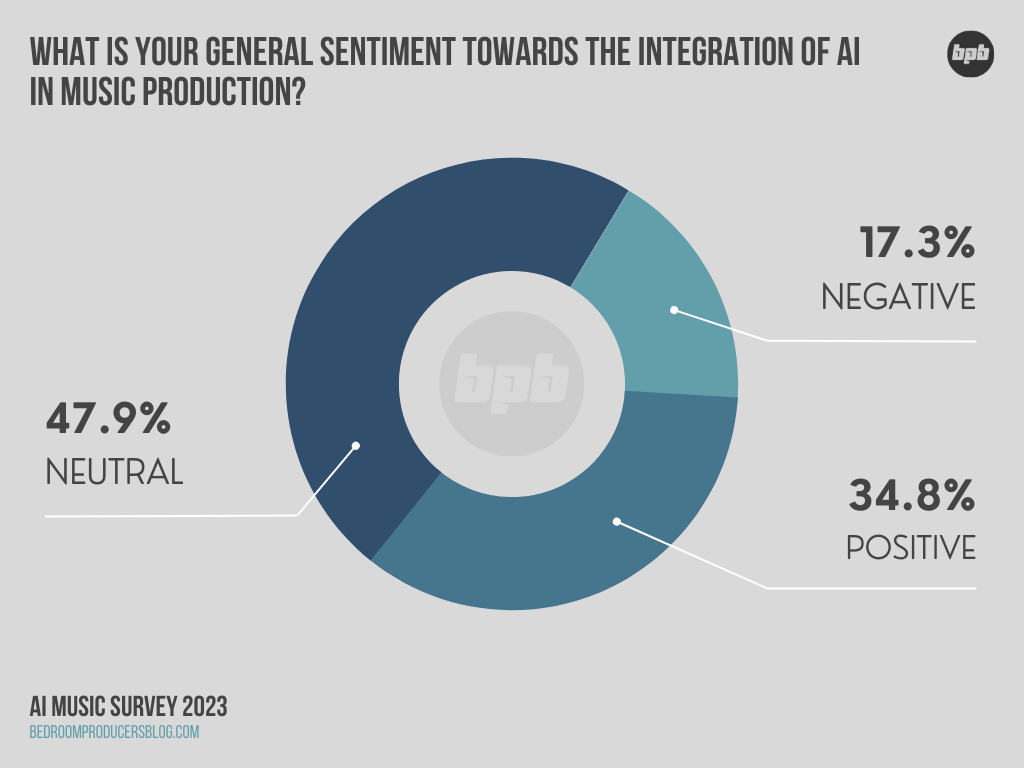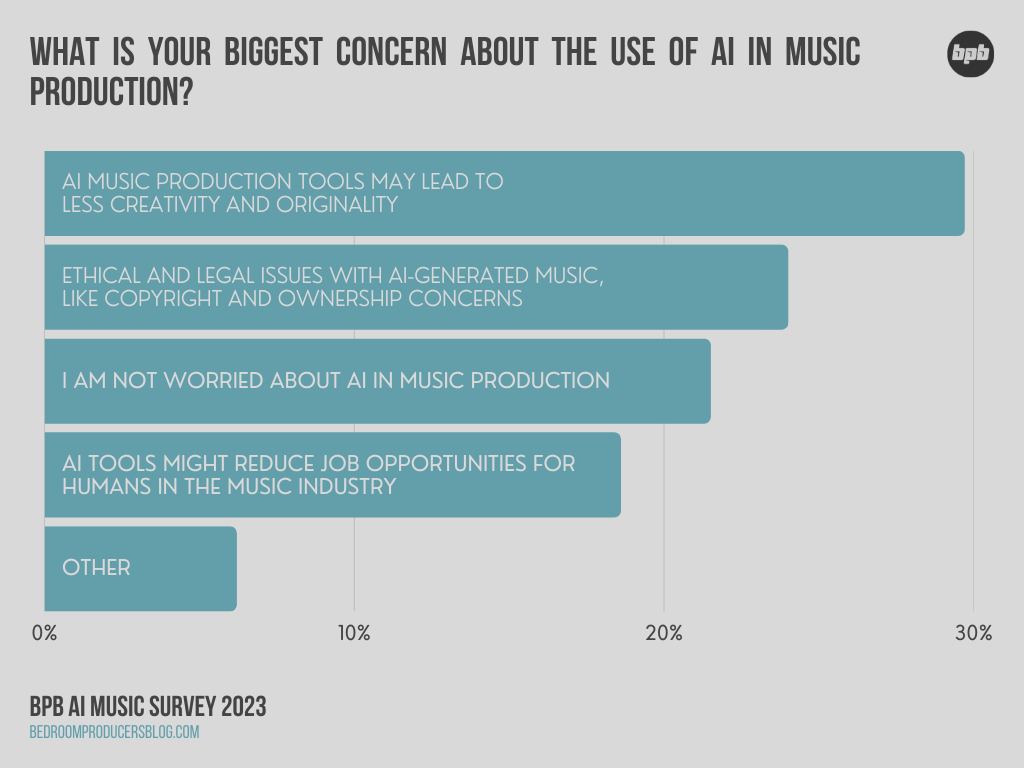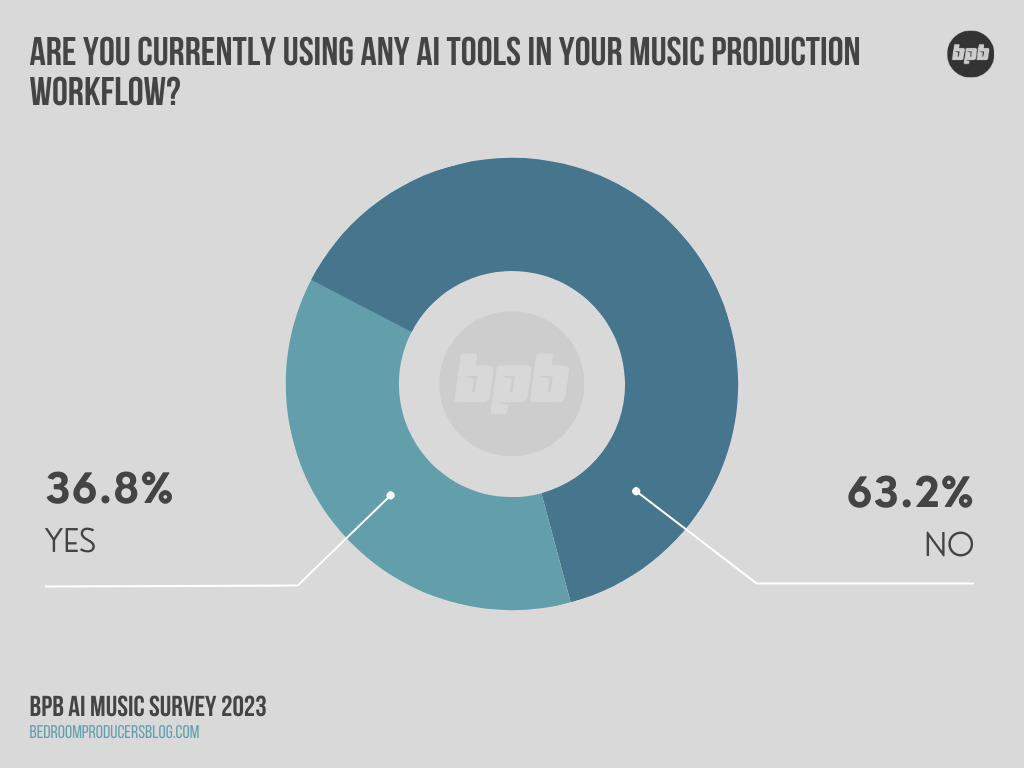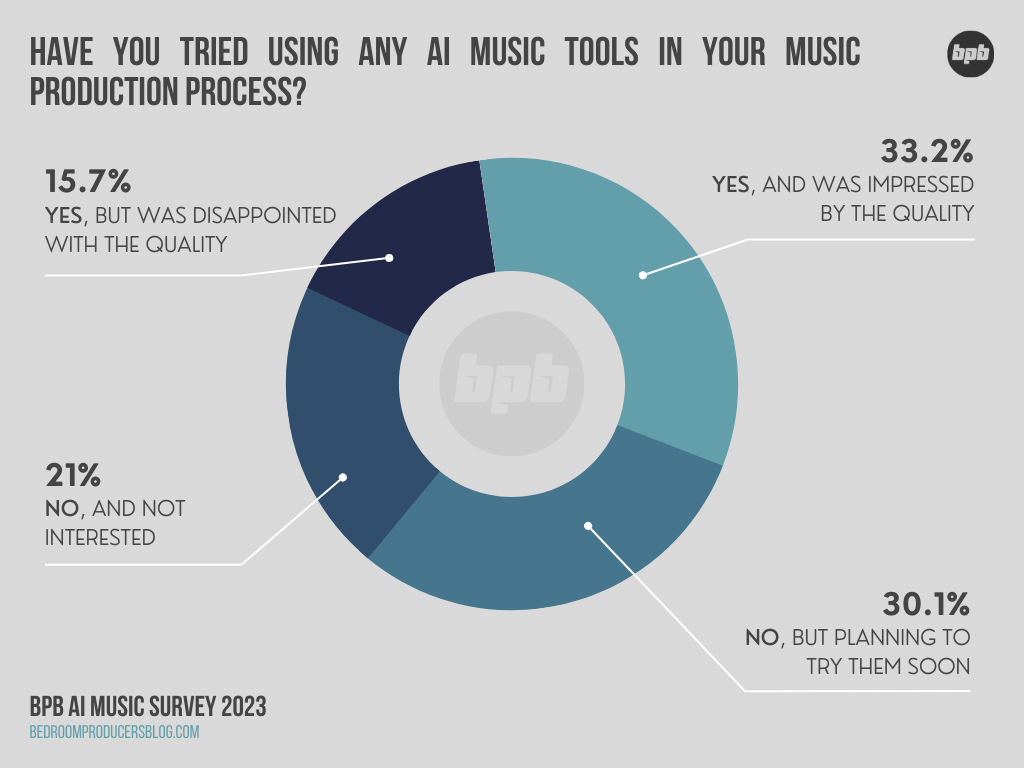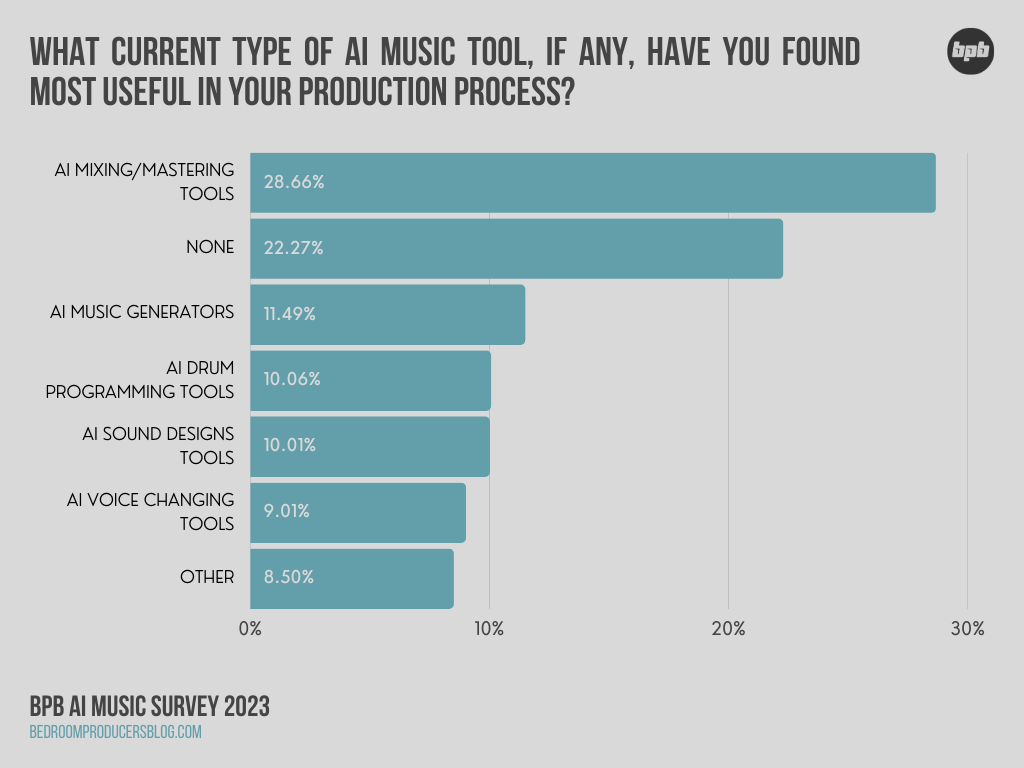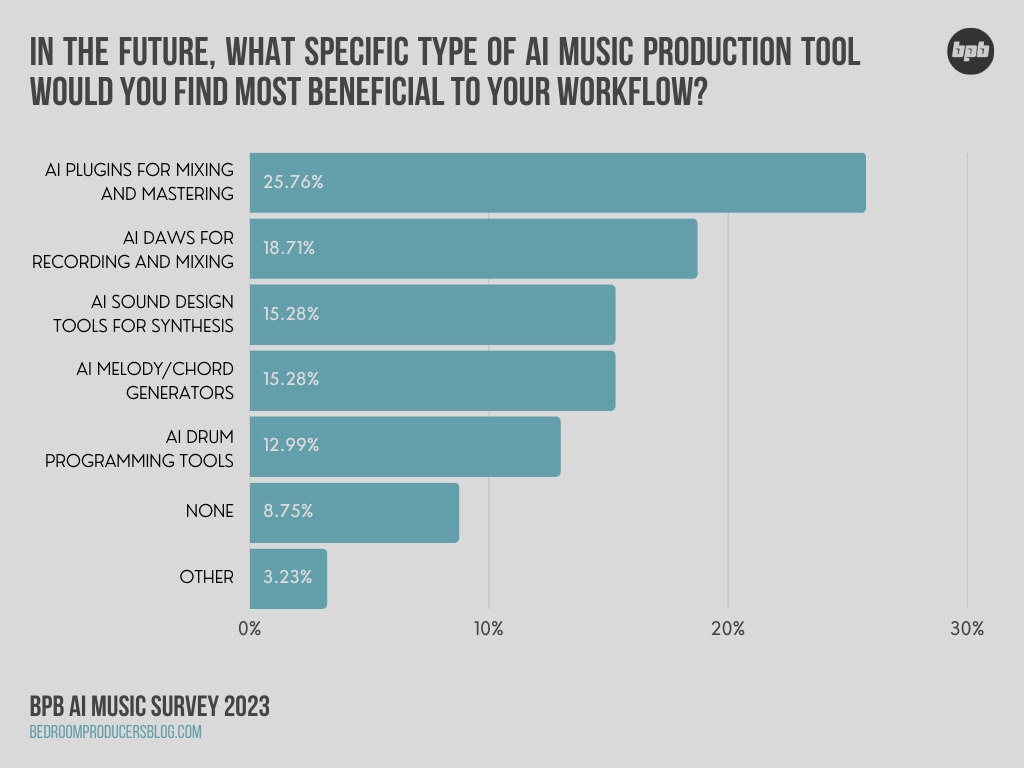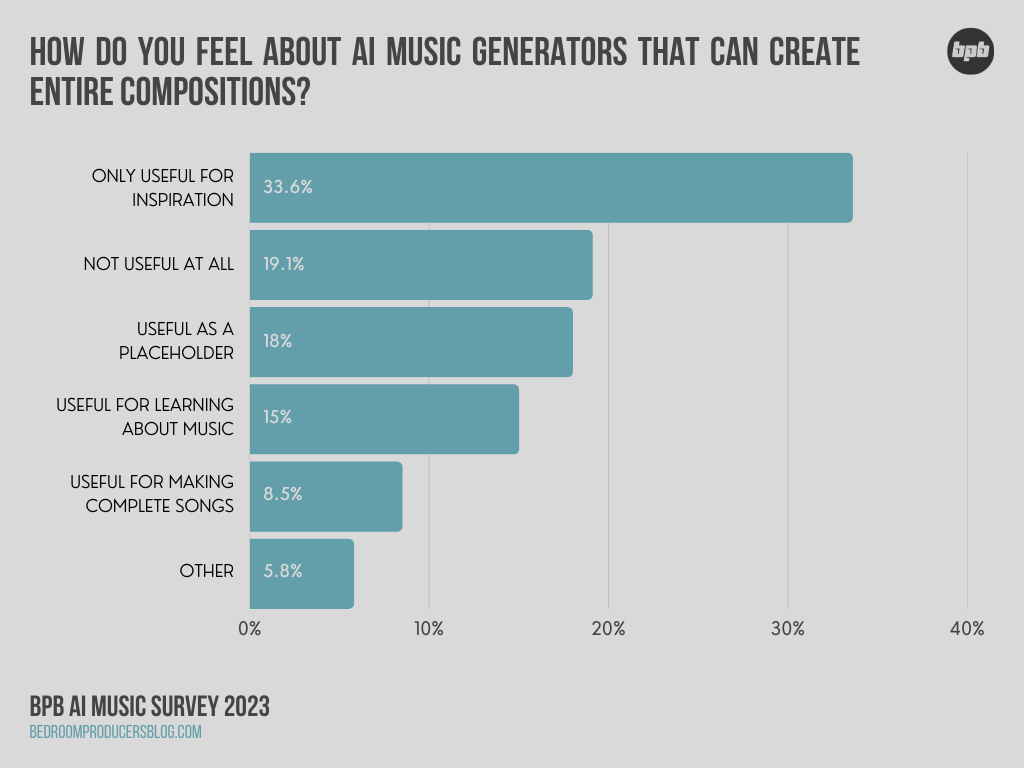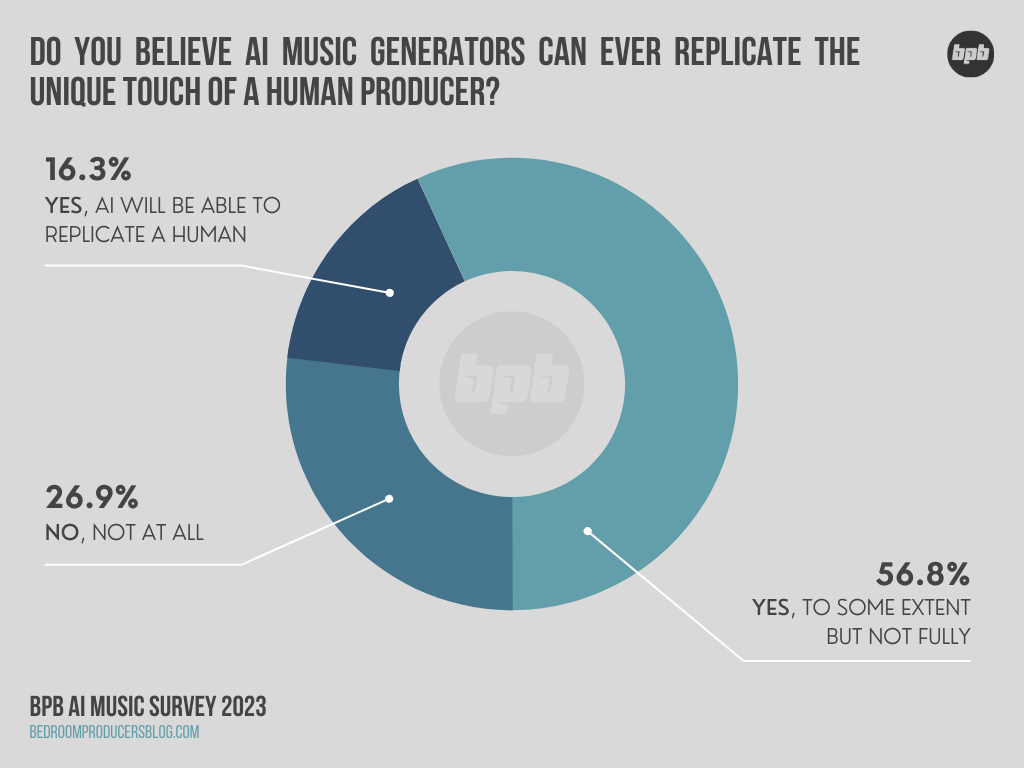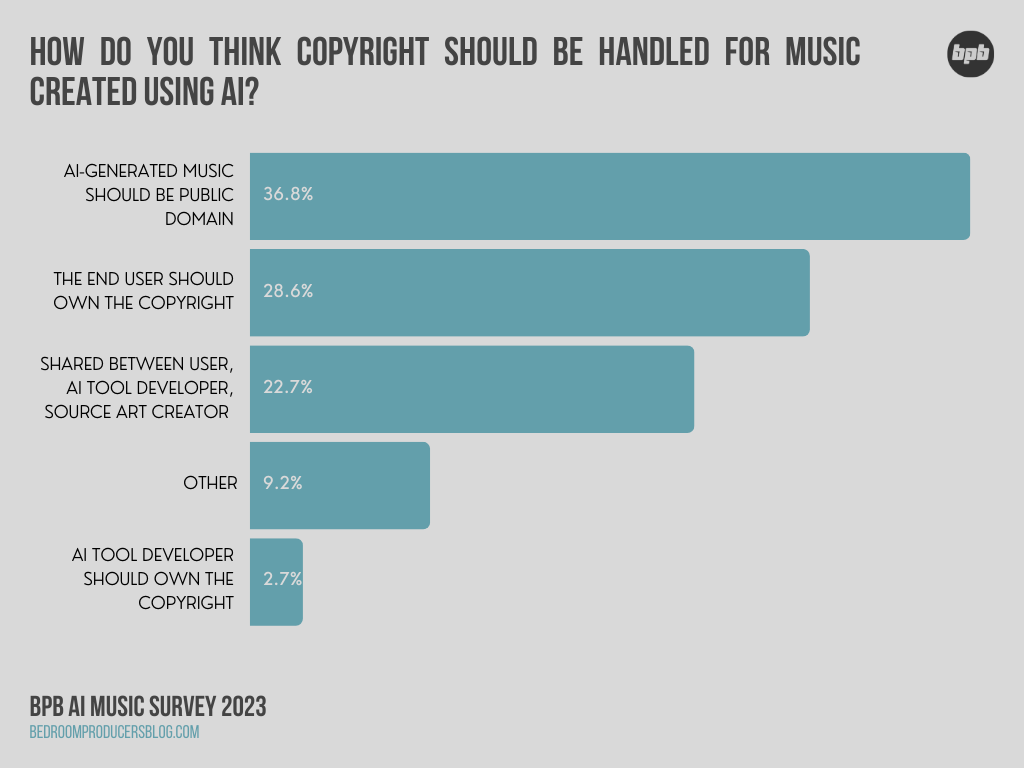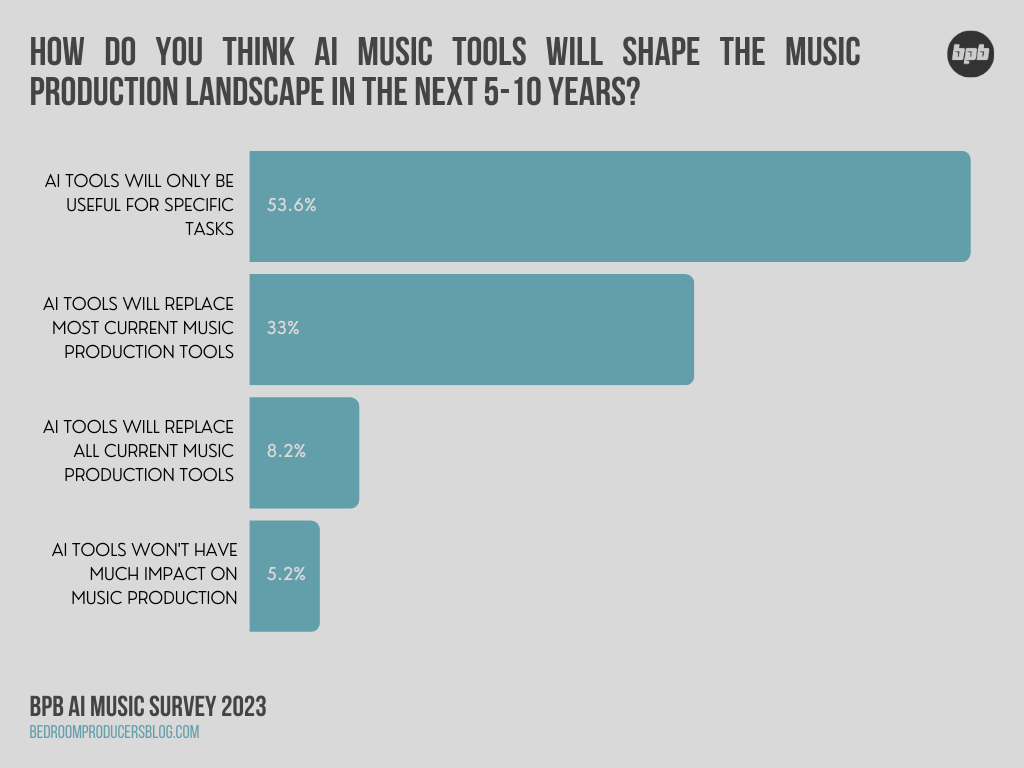Is AI music a threat to creativity or an asset? And how do music producers feel about it? We surveyed 1,500 music producers to find the latest AI music statistics.
You can hardly go anywhere these days without being bombarded by the effects of AI, especially in creative industries. Whether it’s Chat GPT, Midjourney, or otherwise, the advent of AI is here.
But what about music production? Will this new technology affect our recording and mixing tools like VST plugins and digital audio workstations? How will music software change in the future?
Well, we surveyed 1,533 music producers who read BPB to learn what they think about AI.
In this article, we’re going to cover:
- The emergence of AI tools in music production;
- What music producers think about AI.
Read on to discover what we’ve learned!
Key takeaways from the AI music survey
- Only 17.3% of surveyed producers think negatively about using AI in music production. However, almost half (47.9%) are neutral.
- 36.8% of surveyed music producers already use AI tools in their music production workflow.
- 30.1% of music producers are planning to try using AI tools soon. However, 15.7% of surveyed producers had already tried AI tools and were disappointed by their quality.
- 86.6% think that AI music production tools will replace at least some of our current tools.
- Almost a third (29.7%) of music producers fear AI music tools could lead to less originality.
- AI mixing and mastering tools are currently the most popular, with 28.66% of surveyed producers using them already.
- Copyright is the most controversial topic regarding AI music. 36.8% of producers think that AI-generated music should be public domain.
- 73.1% of surveyed producers think that AI music generators could replace human music producers in the future, at least to some extent.
The Growing Landscape of AI in Music Production
Truthfully, AI in music production is not an altogether new concept. In fact, the history of AI use goes back to the 1960s, and mixing and mastering have long been automated (or at least semi-automated).
However, it’s only recently that we’ve really started to see more AI algorithms and generated music hit the scene.
We recently covered this fascinating topic on Bedroom Producers Blog, taking a closer look at AI music copyright and AI music generators.
Some of the areas of music production where AI is starting to (or will) emerge include:
- Effects and mixing processing;
- Mastering services available online;
- Remix and demix processing;
- Sound synthesis and music generation.
In fact, we’re already experiencing AI music in small bursts.
David Guetta recently used an AI voice-changing tool to generate artificial Eminem vocals for a track. Popular tech YouTuber MKBHD recently shared his experience of listening to a song with AI-generated Jay-Z vocals without realizing they were synthetic.
Going further back, we have numerous examples of technology affecting our perception of music. Numerous bands and musicians explored the idea of robots creating music.
Kraftwerk revolutionized the music world by pioneering purely electronic music. Daft Punk became renowned for its robot personas. This aesthetic choice not only created a unique stage presence but also shaped their music, emphasizing a seamless blend of the human and mechanical.
Think about the popular virtual band Gorillaz. While they had humans creating their music rather than AI, they were still a huge chart-topping band — who were seemingly completely virtual.
We, as humans, are fascinated with technology, but there’s also a fear that technology could someday steal humanity from art.
In the future, it’s possible that AI music production will come along in leaps and bounds. But the question remains: will it help us to create new work and art or take away from something which is fundamentally human?
And is the fact that AI can help us speed up the music production process a good or bad thing?
Insights from 1,500 Music Producers: Their Perspective on AI in Music Production
Here’s what you really want to know: what music producers actually think about AI and its effect on music production.
These are the findings from a survey of 1,533 music producers about AI in music production.
We created ten questions about AI music tools, AI-generated music, and AI technology in general. The survey was shared with Bedroom Producers Blog readers in the newsletter, Twitter, and our Facebook group.
The data was collected using Google Forms in May 2023.
What is the general sentiment towards the integration of AI in music production?
Only 17.3% of surveyed music producers felt negative about using AI in music production. This is far below what we expected, considering the doomsday reporting and scenarios often heard on social media.
In fact, most producers either felt positive (34.8%) toward integrating AI in music production or had a very neutral view (47.9%).
However, it’s worth noting that while 17.3% is still the minority, it does reflect the skepticism and apprehension some music producers and musicians feel towards AI and whether or not it could have benefits for music production.
What is the biggest concern about the use of AI in music production?
When we asked music producers what they were most concerned about regarding AI, 29.7% said they were worried that “AI music production tools may lead to less creativity and originality.” In comparison, 24% were worried about “ethical and legal issues with AI-generated music, like copyright and ownership concerns.”
These are more than valid concerns, particularly with regard to copyright, as AI has to learn from somewhere. With no current legislation to set a precedent or clear boundaries, these are problems that will need to be worked out quickly worldwide.
While 18.6% were concerned that AI tools could put music producers out of work, a significant percentage of those surveyed (21.5%) were not worried at all about AI in the context of music.
Current use of AI tools in the music production workflow
Just because there’s a lot of interest in AI does not necessarily mean that everyone’s rushing to jump on the bandwagon. In fact, a whopping 63.2% of those surveyed were not currently using AI tools in their music production workflow.
This may change in the future, but the data points to the fact that music producers are currently already bedded into their music production workflow without the need to incorporate AI technology.
It could also mean that the current AI-based plugins aren’t yet useful enough to substitute traditional music production software.
Have you tried using any AI music tools in your music production process?
When it came to how many people had experimented with AI music tools, the results were very divided.
About a third, 33.2%, had tried them and were impressed with the quality, but 15.7% found the quality to be poor.
Another third, 30.1%, were planning on trying them, while the remainder, 21%, had no interest at all.
An interesting takeaway here is that almost a third of surveyed music producers are planning to try AI tools soon. In the last section, we saw that one-third of producers already use AI music tools.
What current type of AI music tool, if any, have music producers found most useful in their production process?
The answers to this question were quite mixed, too, with 28.6% of those surveyed citing AI Mixing or Mastering tools as the most useful. However, 22.27% didn’t find any useful AI music tools particularly useful.
This data likely points to the fact that there’s still significant room for improvement regarding what AI tools may actually assist the music production process.
However, regarding the usefulness of AI music generators, AI drum sequencing tools, and AI Sound Design/Synthesis tools, the results all hover around the 10–11% mark.
It’s worth noting that only 9.01% found AI Voice Changing tools useful, so we probably won’t be seeing too many more virtual singers anytime soon…!
The key takeaway here is that AI mastering still leads the pack regarding the use of AI technology for music production.
In the future, what specific type of AI music production tool would music producers find most beneficial?
Most producers — 25.76% — were interested in seeing more AI-powered plugins for mixing and mastering in the future. AI-assisted Digital Audio Workstations (DAWs) for assisted recording and mixing are in second place (18.71%).
However, 8.75% were not at all interested in AI tools and felt that none would be beneficial to them and their workflow.
I am particularly interested to see how AI-assisted recording and mixing tools will integrate into DAWs in the future. Could AI technology used in future DAWs help home producers record and mix music more efficiently?
How do producers feel about AI music generators that can create entire compositions?
Across the board, none of the music producers surveyed believed that an AI music generator would be the be-all-and-end-all for human music production.
The majority (33.6%) of productions thought that AI music generators could be useful for inspiration only. This likely indicates that we still desire the human touch in creative work, a criticism that has been leveled at AI across the board.
While the next largest group (19%) of music producers felt that AI music generators held no value, 18% believed that non-musicians could find them helpful for generating placeholder music for ongoing projects.
In comparison, 15% believed that they could be beneficial for educational purposes like analyzing song arrangements and structure.
Do you believe AI music generators can ever replicate the unique touch of a human producer?
Overall, a whopping 56.8% of producers surveyed believed that AI music generators could only replicate humans to some extent, but not fully. In contrast, only 16.3% believed that AI generators could fully replicate human music production.
The remaining 26.9% didn’t believe that AI would ever be able to replicate human production.
These results show that 73.1% of surveyed producers think that AI music generators will be able to replace human music producers either completely or to some extent in the future.
How do producers think copyright should be handled for music created using AI?
When it comes to how AI-created music should be handled with regard to copyright, opinions are divided.
The majority of producers (36.8%) believed that it should belong in the public domain. Another 28.6% believed that the individual who used the AI tool should own the copyright.
Meanwhile, 22.7% believed that the copyright of AI-generated music needed to involve the artists whose music the AI was trained on.
Only 2.7% believed that the developer of the AI tool should own the copyright.
As already discussed, copyright is a hugely contentious point regarding AI and creative work. Unless legislation comes in — and quickly — AI music copyright will continue to be a question. Ultimately, legal frameworks must be adapted globally to fairly recognize all contributions.
When it comes to whether or not the developers of AI tools should have access to the copyright of work produced using their software, this opens up the discussion about whether or not they should retain rights over the output of their technology. Clearly, not many believe they should, but it’s a big conversation.
In other words: it’s complicated!
How do music producers think AI music tools will shape the music production landscape in the next 5–10 years?
Of the producers surveyed, the majority (53.6%) believe that in the future, AI music tools will be useful for specific aspects of production. The next largest group (33%) believed that AI would replace most (but not all) music production tools in the future.
This indicates that most music producers believe that AI tools won’t replace all current music production tools (as 8.2% responded) but will instead be able to facilitate and enhance human production skills.
From this data, therefore, we can assume that there is an openness (86.6%) toward the fact that AI could have transformative potential in our music production workflows in the future.
The Verdict on AI In Music Production
Ultimately, of the music producers we surveyed, the sentiment was quite mixed.
Currently, 36.8% of producers use at least some AI tools to produce music, and 30.1% plan to try them soon. However, 21% aren’t interested in using AI tools, and 15.8% are disappointed by their quality.
That tension between curiosity and a desire to use AI to our benefit reflects the opinion towards AI across the board in all creative industries, especially music.
Some musicians and music producers are eager to see what further developments AI technology could bring, while others completely reject the possibility of adding AI tools into their workflow.
Two major concerns are that using AI music software could produce an avalanche of unoriginal music and cause copyright issues. As for the latter, it all comes down to putting legislation in place to cover all bases and protect creators and musicians.
On a more practical level, most music producers are interested in using AI tools that could enhance their music production workflow. A whopping 86.6% of music producers think that AI-based music production tools will replace at least some of our current music-making gear.
My thoughts on AI technology in music
My excitement about AI in music production comes from seeing how new technology can inspire musicians to create entirely new styles of music. Without synthesizers, we wouldn’t have electronic music. Without electric guitars, rock music wouldn’t exist as we know it.
Hip-hop wouldn’t be the same without the help of 12-bit samplers and the TR-808 drum machine. Likewise, without the TB-303, acid-house music might never have been born.
So, with that in mind, I can’t wait to see the new music styles that will emerge because of AI’s role in music production. We’re about to enter a new chapter in music history, and I’m excited to see how it’ll shape our music.
Last Updated on August 29, 2023 by Tomislav Zlatic.








